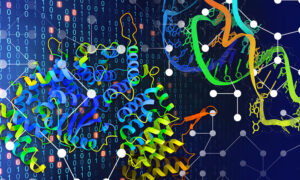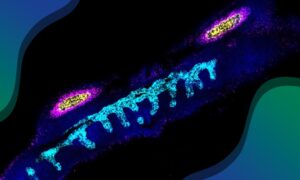New revelations in epigenetic control shed light on breast cancer
Scientists discover that long-term regulation of the human genome is much more dynamic than assumed
Epigenetic regulation – modifications to the structure of chromatin that influence which genes are expressed in a cell – is a key player in embryonic development and cancer formation. Researchers at the European Molecular Biology Laboratory (EMBL) in Heidelberg now gained new insight into one crucial epigenetic mechanism and reveal that it acts much faster than assumed. In this week’s issue of Nature they report that estrogen causes rapid epigenetic changes in breast cancer cells. The new findings impact upon our understanding of how cells interpret their DNA and suggest that epigenetic regulation can affect gene expression immediately and long-term.
Epigenetic changes to the structure of chromatin – tightly packaged DNA – grant or deny access to the molecular machinery that transcribes DNA and thereby regulate gene expression. One of these mechanisms is DNA methylation, where a small chemical residue called a methyl group is added to strategic bases on the DNA. The methyl group prevents the transcription machinery from docking and thereby shuts down gene expression. For a long time scientists have considered methylation a mechanism of long-term regulation of a gene’s activity, because the methylation marks are stable and maintained through cellular replication.
EMBL researchers of the group of Frank Gannon, current director of the Science Foundation Ireland, now found out that methylation marks occur rapidly in breast cancer cells in response to hormones such as estrogen or drug compounds. Estrogen withdrawal or treatment with the established anticancer drug doxorubicin cause the methyl groups to be removed from regulatory regions of specific genes within tens of minutes in human breast cancer cells. The treatment sets off a whole cycle of events: initial demethylation renders silent genes active and subsequent remethylation shuts them down again. This cycle repeats itself every 1.5 hours.
“We observed that unlike assumed for a long time methylation can act on a very short timescale. The results challenge our understanding of epigenetics as a means to regulate gene expression permanently,” says Sara Kangaspeska, who carried out the research together with Brenda Stride.
The new insights into the cyclical nature of methylation might shed light on the molecular bases of cancer and development, both processes involving epigenetic mechanisms.
“In particular breast cancer is affected by estrogen signalling and changes in epigenetic control,” says George Reid, co-senior author of the study. “Our next step will be to find small molecules that target the cyclical methylation processes to elucidate their precise role.”



